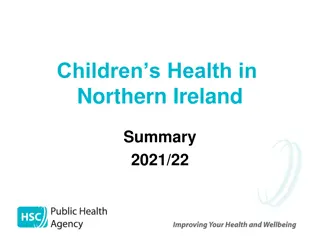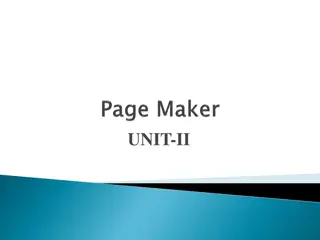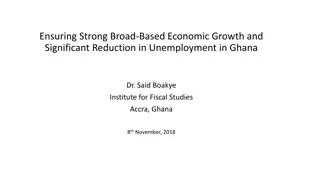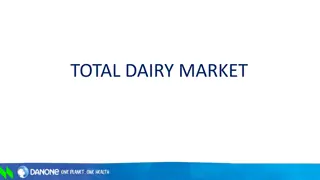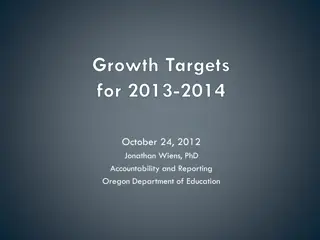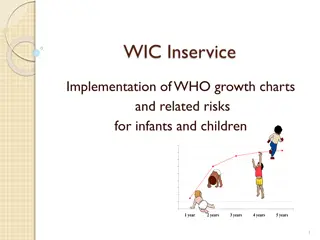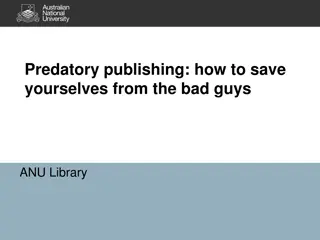New Day in Publishing: Growth & Trends in 2021
Book sales surged in 2020 due to evolving content needs, leading to shifts in publishing strategies. As we enter 2021, a continued rise is expected with insights into genres, formats, and market trends. Nonfiction outpaced fiction driven by societal movements, while comics and graphic novel sales soared, indicating a growing demand for diverse content. Explore the changing landscape and projected growth in the publishing industry for the year ahead.
Download Presentation

Please find below an Image/Link to download the presentation.
The content on the website is provided AS IS for your information and personal use only. It may not be sold, licensed, or shared on other websites without obtaining consent from the author.If you encounter any issues during the download, it is possible that the publisher has removed the file from their server.
You are allowed to download the files provided on this website for personal or commercial use, subject to the condition that they are used lawfully. All files are the property of their respective owners.
The content on the website is provided AS IS for your information and personal use only. It may not be sold, licensed, or shared on other websites without obtaining consent from the author.
E N D
Presentation Transcript
New Year, New Day in Publishing BY LAURIE MCLEAN, FUSE LITERARY
2020: Ch-ch-ch-CHANGES! Everything came to a screeching halt a year ago. First publishing was scared. Will anyone buy any books? And if so how? Then they panicked. They pushed bestseller books off. And further off. And even further off. And they started buying less and less new books. Then they took a deep breath, looked at the sales numbers and were shocked. Even more books were selling than at anytime in the past decade. Then they developed a plan. They pivoted to social media promotions and online bookselling. They started filling the production pipeline with books again. They figured out how their staff could remotely work from home. And publishing thrived. So what next? What s going to happen in 2021?
Why did book sales skyrocket in 2020? 2020 s growth in book sales was driven by wave after wave of content need due to the pandemic. Kids needed scholastic and entertainment books at home. Adults needed nonfiction and fiction titles to understand the evolving situation and to stay sane. Obama s Promised Land memoir sales were huge. Backlist titles like Where the Crawdads Sing by Delia Owens were big. Two big franchises (Twilight & The Hunger Games) published new titles.
Publishing will continue to grow in 2021 751 million print books were sold in 2020. 191 million ebooks were sold in 2020. That s an 8% growth in sales over 2019. Backlist titles grew by 4%, with 14 million more backlist titles sold compared to the previous year. In 2004 (51%). In 2020 (67%). Trade paperbacks saw the highest gains in 2020: up by 36 million units. Ebooks grew by 19 million units (12.6%). Holiday sales were up 12% over 2019. Digital audio sales were up 17% over 2019 sales. And in the first month of 2021, book sales were up 22% year to date. *Figures from The NPD Group/Bookscan
Nonfiction book sales outpaced Fiction Increased sales of nonfiction benefitted from the Black Lives Matter, #MeToo, and social justice movements in the U.S. and abroad. DIY nonfiction sales skyrocketed as people were forced to deal with repairs and upgrades they d been putting off for years. Cookbook sales also soared as more and more people ate at home. And diet book sales also soared for obvious reasons (see above). Finally crafts and hobby books also saw big sales. The losers were books on religion, health/fitness, reference, business, travel. So watch for them to grow in 2021.
Comics & Graphic Novel sales soared Sales rose from 14 million in 2019 to 30 million in 2020. Manga sales skyrocketed as children and adults discovered their appeal. Popular categories were social themes, fantasy, activity books, study aids and language arts. Adult comics/GNs grew 3.7%. Kid comics rose 0.5%. YA titles great 0.2%. Everyone wanted to be entertained.
Online book sales went ballistic This looks to be a permanent trend for 2021 and beyond. It s comfortable, sometimes less expensive, you can find everything online, and you get it delivered to your home so you don t even have to get dressed and go out to shop. In-store sales of books were down only 2% in 2020. But they are declining at a more rapid rate so far in 2021. Online book sales rose 43%. Online sales of everything are now firmly entrenched in people s routines.
Indie bookstores can rebound Barnes & Noble might not make it. At least not with big store footprints. But small indie bookstores understand the importance of community so they will survive, if not exactly thrive. They are absolutely rocking drive-by distribution and delivery. Readers understand the value of local indie bookstores, so the hope is that they ll support the entire ecosystem, online and offline, moving forward. New companies like Bookshop.org couple the ease and value of online shopping with financial support for indie brick-and-mortar stores.
Indie authors: Get ready for growth! Audiobooks could be huge for indies if they can move beyond ACX. Alternative publishing formats are starting to emerge (Serial Box, Radish, Crazy Maple Studio, and Tapas Media for starters with more to come). As e-reader sales skyrocketed, digital content also soared. If KDP titles can be marketed effectively, sales will increase even on backlist titles. Digital means mutable. The author has more control. Try new covers. New pricing. Sales. Repackaged series or bundles. Works from short stories to epics can be marketed together. Get your book included in an anthology of similar books from other authors. And change your metadata over time so it continues to be relevant.
Remote learning and book growth Remote learning has changed the way kids relate with online reading. Just as Apple rose to dominance in the 1980s and 1990s by seeding schools with Apple products, today s kids are now perfectly comfortable with reading digital books, and that will continue into adulthood. Also, watch for innovation in the merging of storytelling, videogames, reading, listening, music and more as these digital natives grow up. I m personally excited about non-linear storytelling and create-your-own- adventure books even though I m still not sure we re there yet.
Virtual book promotion is here to stay The economics of sending an author on a multi-city book tour never made sense except for the uber bestsellers. And fans can find their authors easily online. Fans are less motivated to come out to experience an author signing. Plus many bookstores are still closed. Fans can interact with authors online via social media and Zoom. School visits are pivoting to virtual visits and loving it (cheaper, easier). Virtual promotion is here to stay and will accelerate as new methods are tried and either discarded or adopted.
Micro-communities are born If 2020 was the year of consolidation, 2021 will be the year of innovation. We ve adapted our routines and our processes in order to survive Covid-19 and working at home. Now it s time to innovate to thrive. Micro-communities, which are groups focused on a single voice or area of interest, are emerging as super-popular. Think mommy bloggers, lifestyle influencers, book clubs, fashionista Instagrammers or Tik Tok-ers. Books targeted to this demographic will accelerate their growth. You might be a member of several micro-communities that were formed because we couldn t be together IRL, so they were created online.
Libraries& ebooks: A love story Libraries have rocked ebook lending. It s the most popular lending in libraries today. Publishers need to re-evaluate the pricing model for libraries, because they are gouging these institutions. Amazon is determining what their pricing model for ebook library licensing will look like RIGHT NOW. If they develop a structure that succeeds, it will definitely influence traditional publishers. My prediction: you ll see Amazon-imprints and KDP ebooks in library catalogs by next Christmas if not sooner.
Publishing diaspora will continue More publishing workers have fled New York during the pandemic than ever before. It was not safe. It was not affordable. My prediction: Many will not return once the pandemic is over. Think about how this will impact commercial real estate in Manhattan. Working remotely will become the new publishing norm (hopefully). Zoom meetings will replace in-person meetings. Publishing workers will come to NY monthly for in-person meetings. New York will be the center of publishing in name only. Even though they ll never admit it.
Did I mention DIVERSITY? Diversity in publishing, both in author selection and publishing employees, is a huge social justice movement that I do not believe is going to go away anytime soon. This is great news for marginalized voices that have heretofore been silent. Look at the award-winners in 2020. Look at the bestsellers in 2020. Capturing the zeitgeist of the #BlackLivesMatter, #LatinxVoices, LGBTQIA+, and #MeToo movements is massive right now. The popularity of these authors will only grow as time goes on.
What is publishing in the New Normal? More diverse in author and publisher employee voices. More innovative in the how, what, when, and where of publishing. More profitable, if only by a small amount. It is storytelling across platforms (audio, digital, print, streaming, games). It is growing instead of contracting. Indie authors have a seat at the table. It is open for business.
Q&A Thank you for listening. Now it s time for you to speak. Questions? Laurie McLean, Founding Partner FUSE LITERARY Queries: querymanager.com/lauriemcleanisagentsavant Twitter: @agentsavant @FuseLiterary Website: FuseLiterary.com Instagram: @FuseLiterary



